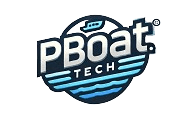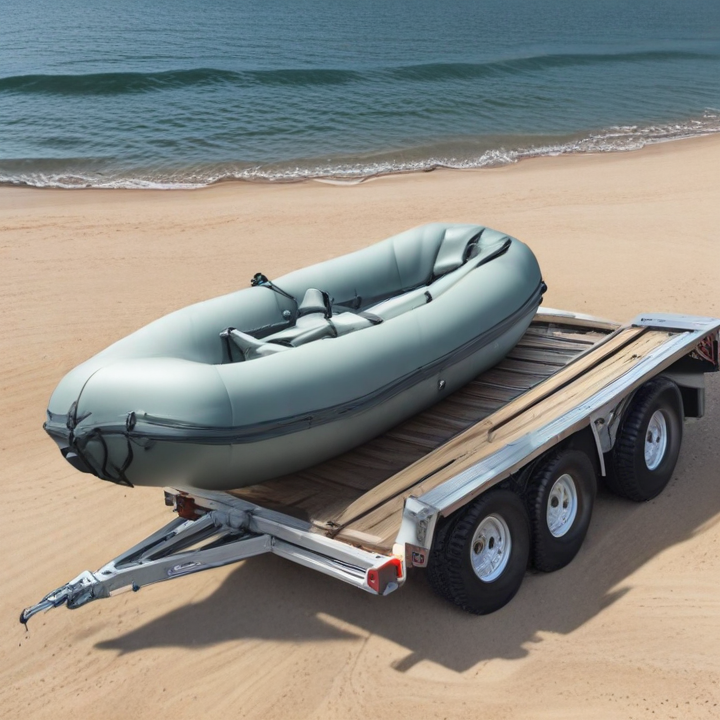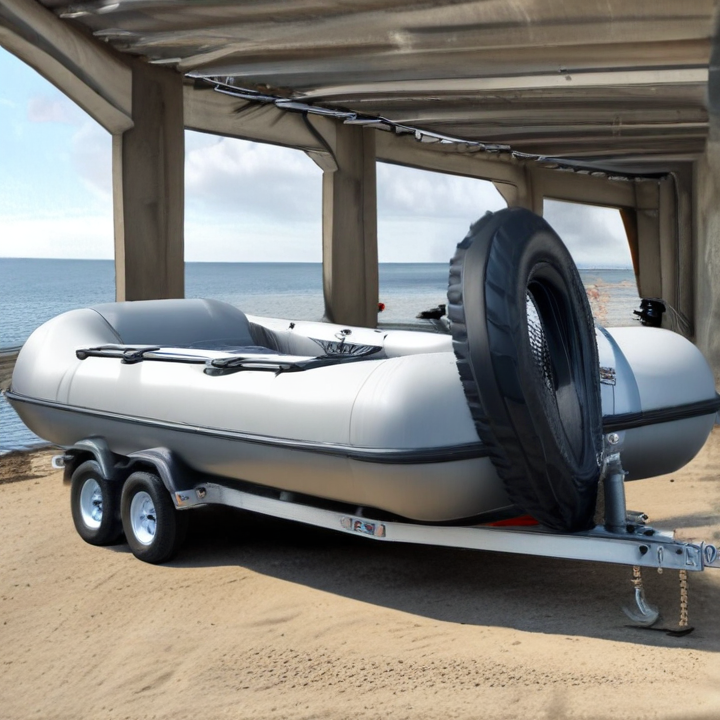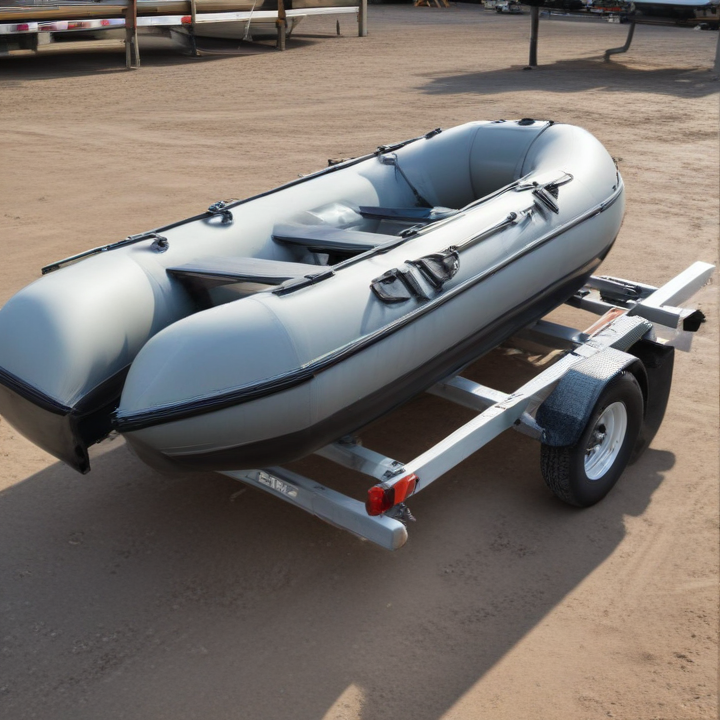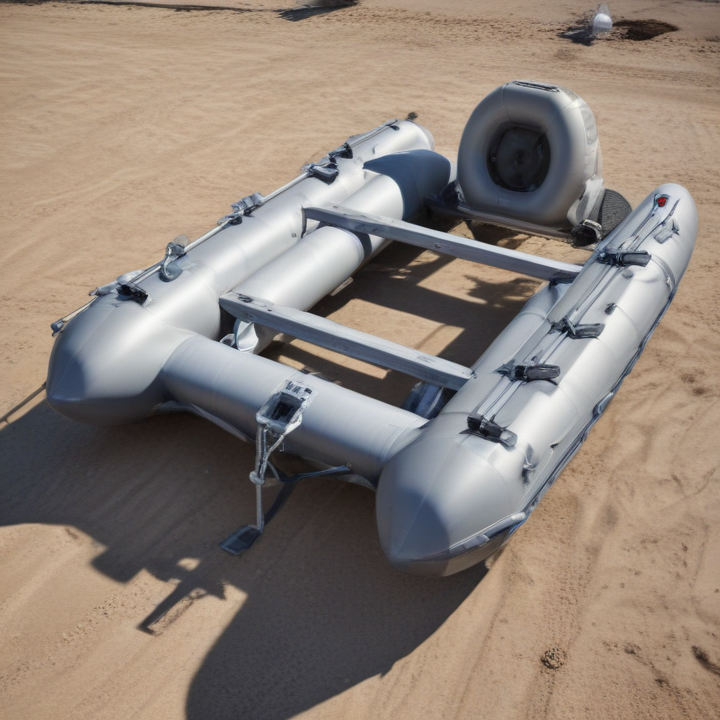inflatable boat trailer Safety Certifications
When selecting an inflatable boat trailer, ensuring safety certifications is crucial to guarantee the trailer’s reliability and compliance with regulatory standards. The key certifications and standards to look for include:
1. National Highway Traffic Safety Administration (NHTSA): In the U.S., trailers must comply with NHTSA regulations, which include requirements for lighting, reflectors, brakes, and overall construction. Check for a certification label indicating compliance with these standards.
2. SAE International Standards: The Society of Automotive Engineers (SAE) provides guidelines for trailer components, including couplings and hitches. Look for trailers that adhere to SAE J684 (hitches and couplings) and SAE J2807 (trailer weight ratings), ensuring they can safely handle the specified load.
3. CE Marking (Europe): In Europe, trailers must meet the European Union’s Machinery Directive and other relevant regulations, which ensure safety, health, and environmental protection. The CE mark indicates compliance with these requirements.
4. Australian Design Rules (ADR): In Australia, trailers must comply with ADR, which sets out the minimum safety standards for construction and performance. This includes regulations for braking, lighting, and stability.
5. Canadian Motor Vehicle Safety Standards (CMVSS): In Canada, trailers must meet CMVSS, which includes requirements for lighting, braking, and tire safety. Compliance is typically indicated by a certification label.
6. Corrosion and Weather Resistance: Given the maritime environment, trailers should meet corrosion resistance standards such as ASTM B117 for salt spray testing. This ensures the trailer can withstand harsh conditions without significant degradation.
When purchasing a trailer, verify these certifications through labels or documentation to ensure it meets safety standards and provides reliable performance for transporting your inflatable boat.
List Reference Technical Parameters of “inflatable boat trailer”
When evaluating an inflatable boat trailer, several technical parameters are essential to ensure compatibility and safety. Here are key reference parameters:
1. Load Capacity:
– Specifies the maximum weight the trailer can carry, including the boat and additional gear.
– Typically ranges from 500 to 2,000 pounds.
2. Trailer Weight:
– The weight of the trailer itself, which affects towing requirements.
– Usually between 150 to 500 pounds.
3. Dimensions:
– Length, width, and height measurements to ensure the boat fits securely.
– Common lengths range from 10 to 18 feet, with widths varying accordingly.
4. Material:
– Construction materials such as galvanized steel, aluminum, or coated steel, impacting durability and corrosion resistance.
– Aluminum is lightweight and rust-resistant, while galvanized steel offers strength and durability.
5. Tire Size:
– Tire dimensions, which affect the trailer’s handling and stability.
– Common sizes include 12 to 15 inches.
6. Axle Configuration:
– Single or tandem axles, determining load distribution and ride quality.
– Single axles are common for lighter loads, while tandem axles provide better stability for heavier loads.
7. Suspension Type:
– Leaf springs or torsion axles, influencing the trailer’s smoothness and load handling.
– Leaf springs are cost-effective, whereas torsion axles offer a smoother ride.
8. Braking System:
– Presence and type of brakes (surge, electric), which are crucial for safety.
– Surge brakes are hydraulic and activate with trailer movement, while electric brakes are controlled via the towing vehicle.
9. Lighting and Wiring:
– Compliance with DOT regulations, including tail lights, brake lights, and turn signals.
– Ensures visibility and safety during towing.
10. Winch and Rollers:
– Winch capacity and roller configuration for easy loading and unloading of the boat.
– Important for minimizing physical effort and ensuring secure transport.
11. Tongue Length and Type:
– Length of the tongue and whether it’s adjustable, which impacts maneuverability and compatibility with various tow vehicles.
– Adjustable tongues offer versatility for different boat sizes.
These parameters are critical for selecting the right trailer for your inflatable boat, ensuring safety, performance, and durability.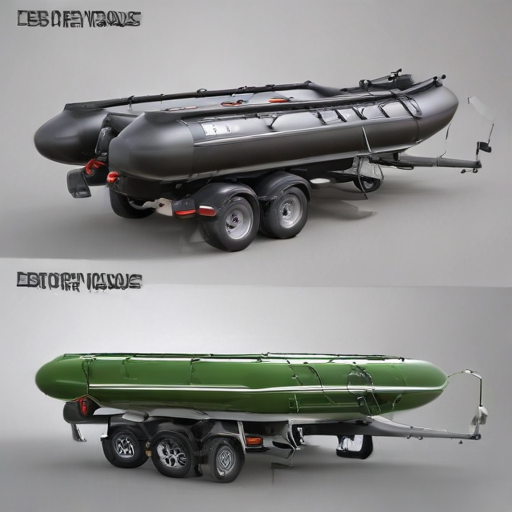
List Product features of “inflatable boat trailer”
An inflatable boat trailer is a specialized transport solution designed to carry inflatable boats securely and conveniently. Here are its key product features:
1. Lightweight Construction: Typically made from aluminum or galvanized steel, ensuring ease of towing and resistance to rust and corrosion.
2. Adjustable Bunks and Supports: Adjustable components to fit various boat sizes and shapes, providing flexibility and secure placement of the inflatable boat.
3. Easy Assembly and Disassembly: Designed for quick setup and breakdown, often with minimal tools required, making it convenient for frequent use and storage.
4. Compact and Portable Design: Can be disassembled or folded into a compact form for easy storage in a car trunk or garage, ideal for limited space scenarios.
5. High-Quality Tires: Equipped with durable, inflatable or solid rubber tires designed for smooth transportation on different terrains, including roads and sandy beaches.
6. Tie-Down Straps and Safety Chains: Includes multiple tie-down points, straps, and safety chains to securely fasten the boat during transport, ensuring safety and stability.
7. Winch System: Manual or electric winch systems to aid in the easy loading and unloading of the boat, reducing manual effort.
8. LED Lighting: Integrated LED lights for visibility and compliance with road regulations, enhancing safety during nighttime or low-light conditions.
9. Suspension System: Some models feature suspension systems to absorb shocks and protect the boat from road vibrations and impacts.
10. Corrosion-Resistant Finish: Coated with anti-corrosion materials to withstand harsh marine environments, extending the trailer’s lifespan.
11. License Plate Holder: Includes a designated holder for a license plate, ensuring compliance with local traffic laws.
12. Capacity and Weight Ratings: Clear labeling of maximum weight capacity and boat size compatibility to ensure safe usage.
These features collectively make an inflatable boat trailer a practical, efficient, and safe solution for transporting inflatable boats.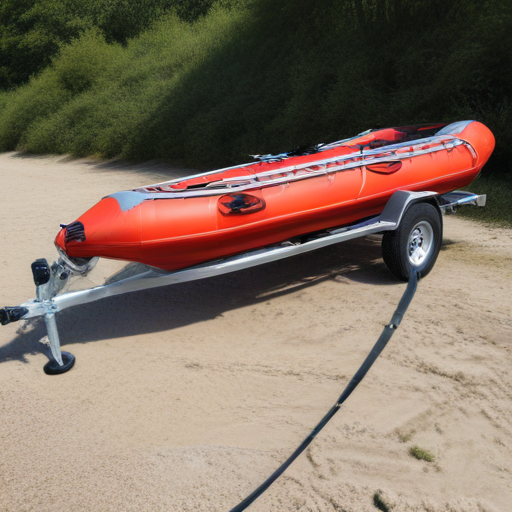
“inflatable boat trailer” Warranty and Support
When purchasing an inflatable boat trailer, understanding the warranty and support options is crucial for ensuring a secure and satisfactory investment.
Warranty
1. Coverage Period: Most inflatable boat trailers come with a manufacturer’s warranty that typically ranges from one to five years. The duration depends on the brand and model.
2. Inclusions: Standard warranties generally cover defects in materials and workmanship. This includes issues with the frame, tires, lights, and other structural components.
3. Exclusions: Common exclusions are damage caused by improper use, accidents, normal wear and tear, and modifications made to the trailer. It’s important to read the fine print to understand what is and isn’t covered.
4. Claims Process: Filing a warranty claim usually requires proof of purchase and documentation of the defect. Some manufacturers might request photos or an inspection before approving a claim.
Support
1. Customer Service: Reliable brands offer robust customer service through various channels, including phone, email, and live chat. Look for companies with responsive and knowledgeable support teams.
2. Technical Assistance: Many manufacturers provide technical support for assembly, maintenance, and troubleshooting. This can include manuals, instructional videos, and FAQs on their websites.
3. Authorized Service Centers: Check if the manufacturer has authorized service centers or partners for repairs and maintenance. This can be crucial for ensuring that any repairs are done correctly and without voiding the warranty.
4. Return Policy: Review the return policy for any dissatisfaction with the product. Some companies offer a money-back guarantee or easy returns within a specified period, usually ranging from 30 to 90 days.
Choosing a trailer with a comprehensive warranty and strong support can provide peace of mind and ensure you have assistance if issues arise. Always compare the warranty and support options of different brands to make an informed decision.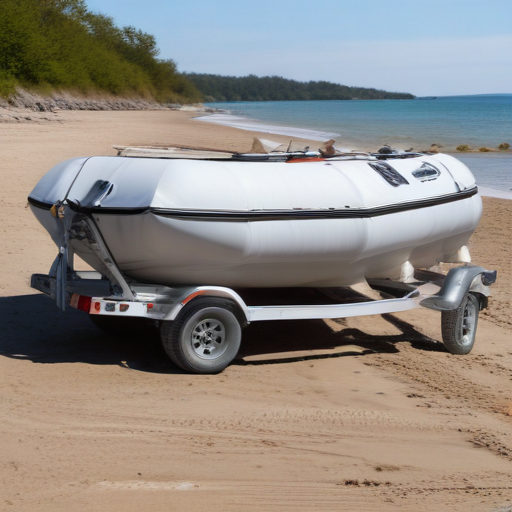
List “inflatable boat trailer” FAQ
Inflatable Boat Trailer FAQ
1. What is an inflatable boat trailer?
An inflatable boat trailer is a specialized trailer designed to transport inflatable boats. It typically features adjustable bunks, rollers, or pads to support and secure the boat during transport.
2. Can I use a regular boat trailer for my inflatable boat?
While it’s possible, an inflatable boat trailer is better suited due to its specific design that accommodates the lighter weight and flexible nature of inflatable boats.
3. What sizes do inflatable boat trailers come in?
Inflatable boat trailers come in various sizes to accommodate different boat lengths and weights. Common sizes range from small trailers for boats under 10 feet to larger ones for boats up to 20 feet.
4. How do I choose the right trailer for my inflatable boat?
Consider the boat’s length, width, and weight. Ensure the trailer can handle the weight and provides adequate support to prevent damage during transport.
5. Do I need to deflate my boat before transporting it on the trailer?
No, inflatable boat trailers are designed to transport boats while inflated. However, always check the boat’s inflation level and secure it properly to the trailer.
6. How do I secure my inflatable boat to the trailer?
Use straps and tie-downs to secure the boat. Ensure it’s balanced on the trailer and that the straps are tight but not overly so, which could cause damage.
7. Can inflatable boat trailers be used for long-distance travel?
Yes, as long as the trailer is properly maintained, the boat is secured correctly, and the trailer’s load capacity is not exceeded.
8. What maintenance is required for an inflatable boat trailer?
Regularly check the tires, wheel bearings, lights, and brakes. Ensure all parts are in good condition and perform any necessary repairs promptly.
9. Are there any legal requirements for towing an inflatable boat trailer?
Yes, ensure the trailer is registered and has the necessary lights and reflectors. Check local regulations regarding trailer towing and adhere to weight limits and safety guidelines.
10. Where can I buy an inflatable boat trailer?
Inflatable boat trailers are available at marine supply stores, boat dealerships, and online retailers. Ensure you purchase from a reputable source and that the trailer meets your specific needs.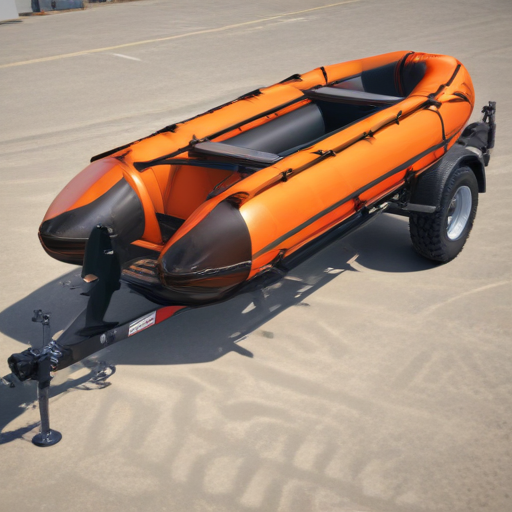
Top 10 FAQ with answer about inflatable boat trailer for Buyer Sourcing from China
Top 10 FAQ for Sourcing Inflatable Boat Trailers from China
1. What are the benefits of sourcing inflatable boat trailers from China?
– Competitive pricing, high-quality manufacturing, and a wide range of options are primary benefits. Chinese suppliers often offer customization and bulk order discounts.
2. How do I find reliable suppliers in China?
– Use verified platforms like Alibaba, Global Sources, and Made-in-China. Check supplier ratings, reviews, and request samples before committing.
3. What materials are commonly used in Chinese inflatable boat trailers?
– Common materials include galvanized steel, aluminum, and stainless steel, which are known for their durability and resistance to corrosion.
4. What should I consider regarding shipping and logistics?
– Understand Incoterms, lead times, and shipping options (air, sea, or rail). Calculate total costs, including customs duties, VAT, and shipping insurance.
5. How can I ensure the quality of the trailers?
– Conduct factory audits, request product certifications (CE, ISO), and arrange for third-party inspections. Testing samples for durability and functionality is also advisable.
6. What are the common payment terms?
– Common terms include T/T (Telegraphic Transfer), L/C (Letter of Credit), and PayPal for smaller transactions. Negotiate payment terms that balance security and cash flow.
7. Are there customization options available?
– Yes, most Chinese manufacturers offer customization for dimensions, load capacity, material, and additional features like lighting or braking systems.
8. What is the typical lead time for orders?
– Lead times vary but typically range from 30 to 60 days, depending on the order size and customization requirements.
9. What kind of after-sales support can I expect?
– Reputable suppliers offer warranties, spare parts availability, and technical support. Clarify these terms before finalizing the purchase.
10. How do I handle import regulations and compliance?
– Ensure compliance with local import regulations. Obtain necessary documentation like the Bill of Lading, Commercial Invoice, and Certificate of Origin. Work with a customs broker to streamline the process.
These FAQs address crucial aspects of sourcing inflatable boat trailers from China, ensuring buyers are well-prepared to make informed decisions.
